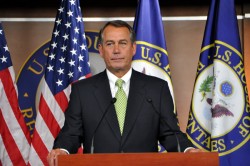National
Boehner on ENDA: ‘I haven’t thought much about it’
Advocates continue to press Obama on exec order

U.S. House Speaker John Boehner (R-Ohio) expressed little interest Wednesday in advancing the Employment Non-Discrimination Act in the wake of an announcement from the White House last week that the Obama administration won’t take action against LGBT workplace discrimination at this time.
Although the administration insists it will work with Congress to pass legislation in lieu of an executive order barring federal contractors from discriminating against LGBT workers, Boehner seemed unaware of ENDA in response to a question from the Washington Blade, saying, “I haven’t seen the bill. I haven’t thought much about it.”
Asked whether passage of ENDA might alleviate the 8.2 percent unemployment rate if employers were barred from firing LGBT workers, Boehner said “ample laws” are in place and deferred further comment to the House Committee on Education & the Workforce. The committee didn’t immediately respond to a request for comment.
“No one should face discrimination in the workforce,” Boehner said. “There are ample laws already in place to deal with this. Having been the chairman of the Education & Workforce Committee, I’m quite familiar with employment law. But if there are further changes that are necessary, I’m sure the committee will look at it.”
Even if Boehner were to bring the bill to a vote, it is unlikely to pass the House where Republican lawmakers hold the majority. ENDA has 161 co-sponsors in the House, far short of the 218 votes that would be needed for passage.
But Boehner’s lack of interest in ENDA raises questions about how the administration expects to move forward with legislation prohibiting LGBT workplace discrimination in the wake of announced plans to work with Congress to the pass the bill instead of taking administrative action and issuing an executive order.
On Monday, White House spokesperson Shin Inouye told the Blade and other media outlets that the “time is right” for a comprehensive legislative approach to passage of ENDA.
Tico Almeida, president of Freedom to Work, said Boehner’s response indicates he doesn’t want to appear to go against the majority of the American public, which backs the idea of legislation protecting LGBT workers from discrimination, according to several polls. Some of those polls show that many Americans remain under the false impression that such a law is already in place.
“I think Speaker Boehner ducked this question from the Washington Blade because he does not want to have to publicly side with the small and decreasing number of Americans who tell pollsters that simply being gay should be grounds for firing a talented and hard working employee,” Almeida said. “Polling data shows that LGBT workplace fairness is quickly becoming a winning wedge issue to use against pro-discrimination politicians who hold antiquated and un-American beliefs.”
Meanwhile, LGBT advocates continue to push President Obama to issue the executive order — despite the announced “no” on the proposed action delivered to them last week — as they call for congressional action in the Democratic-controlled Senate on ENDA. The Blade reported extensively on the importance of a trans-inclusive hearing and markup on the bill last month.
Michael Cole-Schwartz, an HRC spokesperson, alluded to the importance of a hearing as he lambasted Boehner for his response to the legislation.
“If the speaker is so familiar with employment law he should know it’s perfectly legal to fire LGBT people in most states,” Cole-Schwartz said. “This attitude is precisely why we need congressional hearings on an inclusive ENDA so the costs of employment discrimination are put on full display.”
No federal law or federal regulation bars employers from firing LGBT workers based on their sexual orientation or gender identity. Firing or discriminating against someone because they’re gay is legal in 29 states; firing or discriminating against someone because they’re transgender is legal in 34 states.
Despite calls for a Senate hearing on ENDA, the Senate Health, Education, Labor & Pensions Committee hasn’t yet scheduled a hearing on the legislation.
Justine Sessions, a Senate HELP Committee spokesperson, said this week no plans are in place to hold a hearing on the bill.
“Sen. Harkin is strongly supportive of an inclusive ENDA and looks forward to working with Sen. Merkley and other supporters to advance this important issue,” Sessions said. “The HELP Committee has not planned any hearings beyond the month of May, but I am happy to keep you posted.”
On the same day Boehner punted to the House Committee on Education & the Workforce on ENDA, the committee in fact held a hearing on a related issue: the impact of regulatory and enforcement actions of the Office of Federal Contract Compliance Programs.
The hearing is significant because it would have been an opportunity to discuss the proposed executive order requiring companies doing business with the U.S. government to have non-discrimination policies protecting LGBT employees. Multiple sources have said the Labor and Justice Departments cleared the measure before sending it to the White House, which announced last week it won’t take action at this time on the directive.
According to a news statement from Freedom to Work, no complaints were voiced about the executive order despite the nature of the hearing.
“Today’s congressional hearing featured three Republican-selected witnesses, including business representatives, and not a single one of them complained about the proposal to add LGBT Americans to the Labor Department’s rules that ensure taxpayer dollars are not squandered by discriminatory contractors who allow anti-gay hostile work environments,” Almeida said. “Not a single Republican member of Congress who attended the hearing complained either.”
In an email to the Blade, Almeida clarified that the executive order didn’t come up in any capacity during the hearing in addition to no one voicing any complaints about it. Rep. George Miller (D-Calif.), ranking Democrat on the committee, was among 72 House members who wrote to Obama urging him to sign the executive order.
Almeida stressed the importance of signing the executive order as the most immediate way to provide protections to LGBT workers.
“Ever since I attended the White House meeting last Wednesday with Valerie Jarrett, White House spokesperson Jay Carney has been ducking questions from the press and making up lame excuses to justify the president’s delay in signing this executive order that Barack Obama promised four years ago he would sign if we helped elect him,” Almeida said. “I agree with the Center for American Progress and the Human Rights Campaign that President Obama should sign the LGBT order now. To quote the president’s own words, ‘We can’t wait.’”
A transcript of the exchange between Boehner and the Blade follows:
Washington Blade: Mr. Speaker, the White House announced the president won’t issue an executive order requiring federal contractors to have non-discrimination policies in place preventing them from firing workers who are gay or transgender. Instead, they said he wants to work with Congress to pass legislation known as the Employment Non-Discrimination Act, which would bar most employers from discriminating against workers on this basis. What are your views on this legislation and would you be open to bringing it up for a vote?
Boehner: I haven’t seen the bill. I haven’t thought much about it.
Blade: Arguably, among those who are in the 8.2 percent who are unemployed are in that situation because they faced discrimination on this basis. Wouldn’t passage of this legislation —
Boehner: Well, no one should face discrimination in the workforce. There are ample laws already in place to deal with this. Having been the chairman of the Education & Workforce Committee, I’m quite familiar with employment law. But if there are further changes that are necessary, I’m sure the committee will look at it.
U.S. Supreme Court
Supreme Court to consider bans on trans athletes in school sports
27 states have passed laws limiting participation in athletics programs

The U.S. Supreme Court on Thursday agreed to hear two cases involving transgender youth challenging bans prohibiting them from participating in school sports.
In Little v. Hecox, plaintiffs represented by the ACLU, Legal Voice, and the law firm Cooley are challenging Idaho’s 2020 ban, which requires sex testing to adjudicate questions of an athlete’s eligibility.
The 9th U.S. Circuit Court of Appeals described the process in a 2023 decision halting the policy’s enforcement pending an outcome in the litigation. The “sex dispute verification process, whereby any individual can ‘dispute’ the sex of any female student athlete in the state of Idaho,” the court wrote, would “require her to undergo intrusive medical procedures to verify her sex, including gynecological exams.”
In West Virginia v. B.P.J., Lambda Legal, the ACLU, the ACLU of West Virginia, and Cooley are representing a trans middle school student challenging the Mountain State’s 2021 ban on trans athletes.
The plaintiff was participating in cross country when the law was passed, taking puberty blockers that would have significantly reduced the chances that she could have a physiological advantage over cisgender peers.
“Like any other educational program, school athletic programs should be accessible for everyone regardless of their sex or transgender status,” said Joshua Block, senior counsel for the ACLU’s LGBTQ and HIV Project. “Trans kids play sports for the same reasons their peers do — to learn perseverance, dedication, teamwork, and to simply have fun with their friends,” Block said.
He added, “Categorically excluding kids from school sports just because they are transgender will only make our schools less safe and more hurtful places for all youth. We believe the lower courts were right to block these discriminatory laws, and we will continue to defend the freedom of all kids to play.”
“Our client just wants to play sports with her friends and peers,” said Lambda Legal Senior Counsel Tara Borelli. “Everyone understands the value of participating in team athletics, for fitness, leadership, socialization, and myriad other benefits.”
Borelli continued, “The U.S. Court of Appeals for the Fourth Circuit last April issued a thoughtful and thorough ruling allowing B.P.J. to continue participating in track events. That well-reasoned decision should stand the test of time, and we stand ready to defend it.”
Shortly after taking control of both legislative chambers, Republican members of Congress tried — unsuccessfully — to pass a national ban like those now enforced in 27 states since 2020.
Federal Government
UPenn erases Lia Thomas’s records as part of settlement with White House
University agreed to ban trans women from women’s sports teams

In a settlement with the Trump-Vance administration announced on Tuesday, the University of Pennsylvania will ban transgender athletes from competing and erase swimming records set by transgender former student Lia Thomas.
The U.S. Department of Education’s Office for Civil Rights found the university in violation of Title IX, the federal rights law barring sex based discrimination in educational institutions, by “permitting males to compete in women’s intercollegiate athletics and to occupy women-only intimate facilities.”
The statement issued by University of Pennsylvania President J. Larry Jameson highlighted how the law’s interpretation was changed substantially under President Donald Trump’s second term.
“The Department of Education OCR investigated the participation of one transgender athlete on the women’s swimming team three years ago, during the 2021-2022 swim season,” he wrote. “At that time, Penn was in compliance with NCAA eligibility rules and Title IX as then interpreted.”
Jameson continued, “Penn has always followed — and continues to follow — Title IX and the applicable policy of the NCAA regarding transgender athletes. NCAA eligibility rules changed in February 2025 with Executive Orders 14168 and 14201 and Penn will continue to adhere to these new rules.”
Writing that “we acknowledge that some student-athletes were disadvantaged by these rules” in place while Thomas was allowed to compete, the university president added, “We recognize this and will apologize to those who experienced a competitive disadvantage or experienced anxiety because of the policies in effect at the time.”
“Today’s resolution agreement with UPenn is yet another example of the Trump effect in action,” Education Secretary Linda McMahon said in a statement. “Thanks to the leadership of President Trump, UPenn has agreed both to apologize for its past Title IX violations and to ensure that women’s sports are protected at the university for future generations of female athletes.”
Under former President Joe Biden, the department’s Office of Civil Rights sought to protect against anti-LGBTQ discrimination in education, bringing investigations and enforcement actions in cases where school officials might, for example, require trans students to use restrooms and facilities consistent with their birth sex or fail to respond to peer harassment over their gender identity.
Much of the legal reasoning behind the Biden-Harris administration’s positions extended from the 2020 U.S. Supreme Court case Bostock v. Clayton County, which found that sex-based discrimination includes that which is based on sexual orientation or gender identity under Title VII rules covering employment practices.
The Trump-Vance administration last week put the state of California on notice that its trans athlete policies were, or once were, in violation of Title IX, which comes amid the ongoing battle with Maine over the same issue.
New York
Two teens shot steps from Stonewall Inn after NYC Pride parade
One of the victims remains in critical condition

On Sunday night, following the annual NYC Pride March, two girls were shot in Sheridan Square, feet away from the historic Stonewall Inn.
According to an NYPD report, the two girls, aged 16 and 17, were shot around 10:15 p.m. as Pride festivities began to wind down. The 16-year-old was struck in the head and, according to police sources, is said to be in critical condition, while the 17-year-old was said to be in stable condition.
The Washington Blade confirmed with the NYPD the details from the police reports and learned no arrests had been made as of noon Monday.
The shooting took place in the Greenwich Village neighborhood of Manhattan, mere feet away from the most famous gay bar in the city — if not the world — the Stonewall Inn. Earlier that day, hundreds of thousands of people marched down Christopher Street to celebrate 55 years of LGBTQ people standing up for their rights.
In June 1969, after police raided the Stonewall Inn, members of the LGBTQ community pushed back, sparking what became known as the Stonewall riots. Over the course of two days, LGBTQ New Yorkers protested the discriminatory policing of queer spaces across the city and mobilized to speak out — and throw bottles if need be — at officers attempting to suppress their existence.
The following year, LGBTQ people returned to the Stonewall Inn and marched through the same streets where queer New Yorkers had been arrested, marking the first “Gay Pride March” in history and declaring that LGBTQ people were not going anywhere.
New York State Assemblywoman Deborah Glick, whose district includes Greenwich Village, took to social media to comment on the shooting.
“After decades of peaceful Pride celebrations — this year gun fire and two people shot near the Stonewall Inn is a reminder that gun violence is everywhere,” the lesbian lawmaker said on X. “Guns are a problem despite the NRA BS.”
-

 U.S. Supreme Court5 days ago
U.S. Supreme Court5 days agoSupreme Court to consider bans on trans athletes in school sports
-

 Out & About5 days ago
Out & About5 days agoCelebrate the Fourth of July the gay way!
-

 Virginia5 days ago
Virginia5 days agoVa. court allows conversion therapy despite law banning it
-

 Opinions5 days ago
Opinions5 days agoCommunity comes together to repair WorldPride history exhibition













